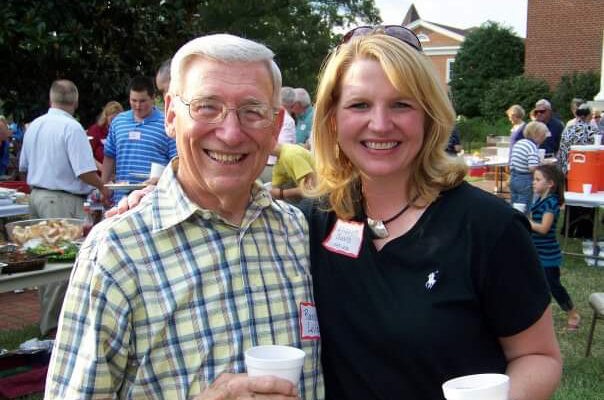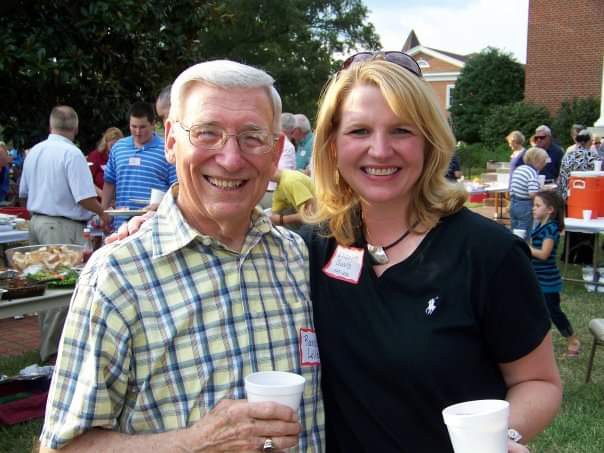In 1980, Chuck Poole was a young college graduate from rural Georgia who had been convinced by a friend to enroll at Southeastern Baptist Theological Seminary in Wake Forest, N.C. Poole and his wife, Marcia, loaded all their worldly possessions into a U-Haul truck and headed north.
“By now we have a baby with us, 6-month-old Joshua,” Poole explained. “We think we have an apartment in Raleigh. We get there, and there is no apartment. We don’t know a living soul in the state of North Carolina, but somehow or another I had Randall Lolley’s home phone number.”
Lolley was president of the Southern Baptist Convention seminary at the time.
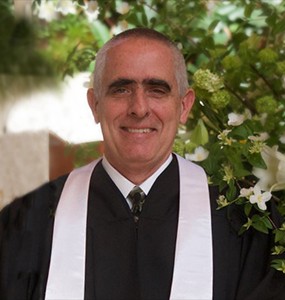
Chuck Poole
“I don’t know what else to do, there are no cell phones, and I remember Marcia and I are sitting on a curb somewhere in Raleigh and everything we own in the back of a U-Haul truck. We have very little money. We have to turn in the U-Haul truck. So I went to a pay phone and called Randall Lolley.
“It’s dark by now. He answered the phone. He doesn’t know me. … I explained that I’m a new student and I told him what had happened,” Poole recalled. “Now understand, I’m coming from a world where my dad quit school when he was 13, and I’m about the most unsophisticated kid on the planet. …. Dr. Lolley said, ‘Y’all come over here and I’m gonna call the maintenance people. We’ll figure it out.’
“By the time we got there, we sat down and he already had it all lined up for the maintenance guys to move our furniture out of that truck into the basement of the president’s home. He looked at me and said, ‘Chuck, you can’t afford to keep that truck one more day.’ He arranged for us to spend the night in the seminary guest house and said they would help us find an apartment the next day.”
“Here’s a president doing what Jesus was would do if Jesus were the president of a seminary and had a big house.”
That story, Poole said, epitomizes the life of Randall Lolley, who died March 21 at age 90. “Here’s a president doing what Jesus would do if Jesus were the president of a seminary and had a big house.”
Poole, who today is pastor of Northminster Baptist Church in Jackson, Miss., is among the many former students and pastoral colleagues of Lolley’s who this week are remembering his profound influence on their lives.
Shaping young staff members
Charles and Elizabeth Qualls are among that number.
From 1995 to 1999, Charles Qualls served as associate pastor for Christian education at First Baptist Church of Greensboro, while Lolley was senior pastor. Elizabeth Qualls, who today is a public library administrator, found her first paid job as a librarian at the church.
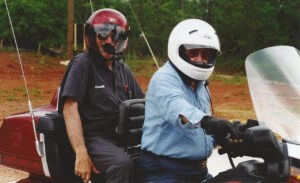
Randall Lolley riding on the back of a Honda Goldwing driven by Don Boynton, father of Elizabeth Qualls.
“He treated that position just like any other staff position,” she recalled. “It gave me a chance to be a full part of the group, with worship leadership responsibilities and input into what we did. He took that vast church library seriously and provided for it to be run well.”
Lolley “had a mind to be admired, and he’s going to be missed,” she added. “But I think of him as a friend. You could joke around with him, too. Like the time we were headed to CBF General Assembly in 1996 and he wanted to host us all for dinner there. But he had announced his retirement, and we knew getting him through a crowd was going to be tough. I took a big paper grocery bag, cut out eye holes and wrote in big letters, “I’m nobody. Ignore me.” He put that bag on in front of the whole church just to get a laugh. Some poor special collections librarian inherited that, along with all of Randall’s papers, because he saw to it that the bag was included when all of those boxes were donated.”
Charles Qualls was a young minister who came under Lolley’s tutelage. He was just three years out of seminary, and Greensboro was his first staff position in a large church.
He remembers: “The first time I met him, Randall said to me, ‘I’m here to meet you because we got your resume and our committee thinks you could be the one for the job. But I also think I could teach you a few things. If you’ll come work with us, I think you’ll fit in well.’ I don’t know if I delivered my part. But Randall surely delivered his. I took away habits and practices for hospital visitation, officiating funerals and working with volunteers that shaped me mightily.”
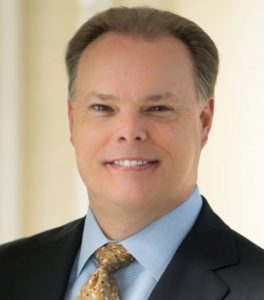
Charles Qualls
As a pastor, Lolley demonstrated how to do the hard parts of church work and still love people, Charles Qualls added. “He was such a generous listener and could take a complex situation and use his words to virtually make options come to life in 3-D. I understand that I had a rare opportunity to come alongside and learn from him.”
Even though in many ways Lolley was a victim of the changing tides of SBC politics, he found a way to help guide others through the same choppy waters.
“He guided and mentored me pastorally through my own grief and loss within my Southern Baptist home and showed me how to find new places to serve,” Charles Qualls said. “Randall was as innately gifted a minister as I have worked with. His intellect was rare, but his use of it was so tame. He didn’t feel a need to bully anyone with his smarts.”
Encouraging the Cooperative Baptist Fellowship
One of the most significant ways Lolley turned his SBC trials into a way to help others was through shaping the idea of a new kind of denominational entity that became the Cooperative Baptist Fellowship.
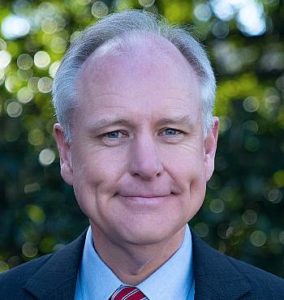
Paul Baxley
“Many of us know well Randall’s courageous and faithful leadership not only at Southeastern Baptist Theological Seminary but among the larger Baptist community that formed the Cooperative Baptist Fellowship,” explained Paul Baxley, CBF executive coordinator. “He was instrumental in the establishment not only of the Cooperative Baptist Fellowship but also the Cooperative Baptist Fellowship of North Carolina.
“To this day, there is a scholarship in CBF North Carolina that bears the name of Randall and Lou Lolley, a witness to their life-long investment in the cultivation of faithful ministers for the church. Randall was an incredibly gifted pastor who loved Christ and the church and brought boundless energy, remarkable resilience and steadfast hope to leading congregations to deeper faithfulness and more transformative ministry in their communities. He was a mentor to many and a friend to even more.”
Shaping CBF North Carolina
One of those who inherited Lolley’s legacy in North Carolina is Larry Hovis, executive coordinator of CBF North Carolina.
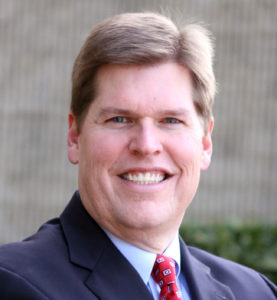
Larry Hovis
“To say that Randall Lolley was a giant among free and faithful Baptists would be a gross understatement,” Hovis said. “From exemplary pastoral leadership to shaping a whole generation of ministers, to lending strong leadership in the early days of our CBF family, Randall left an indelible mark on countless pastors, their churches and an entire movement. God’s kingdom on earth was made more fully manifest because of Randall. He cannot be replaced and he will never be forgotten.”
Influencing theological education
Lolley was a beloved figure even among faculty and staff of other Baptist institutions — in part because he was so loved by his own faculty at Southeastern, according to Molly Marshall, who taught theology at Southern Baptist Theological Seminary while Lolley was president at Southeastern and who also was under intense attack by fundamentalists.
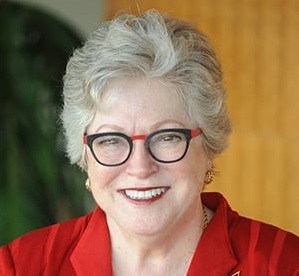
Molly Marshall
“I remember traveling with a few faculty colleagues to process with the Southeastern faculty at Randall Lolley’s final commencement,” Marshall said. “Held in immense respect by his faculty and those of us enduring the travail of the fundamentalist takeover of the Southern Baptist Convention, his leadership demonstrated integrity, plain-spoken truth and immense courage.
“I am deeply grateful for his stalwart commitment to women in ministry. Fond of preaching ‘last at the cross and first at the tomb,’ Dr. Lolley extolled the promise of women’s leadership.”

Bill Leonard
Likewise, Bill Leonard, who taught church history at Southern Seminary while Lolley was president at Southeastern, hailed Lolley as “a great preacher, pastor and educator, also a man of considerable courage who, at a time of theological controversy and intimidation among Southern Baptists, lived out his conscience when called to do so.”
One of Leonard’s fondest memories is of the time he and Lolley co-led a group attending the Baptist World Alliance meeting in Birmingham, England, in 2005. “It was a great experience that I shall never forget.”
Training children and youth
Jennifer Byard Talley has known Lolley since she was 4 years old. Her father, Rod Byard, served on staff with Lolley at First Baptist Church of Winston-Salem, N.C., and then took an administrative position at Southeastern. Rod Byard was among the five seminary leaders who resigned along with Lolley in 1987.
“One thing that I always remember my parents saying was that Randall knew how to put a staff together,” Talley said. “He knew whose personalities would complement each other and who would work well together.”
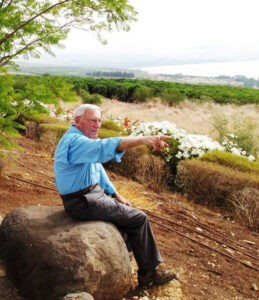
Randall Lolley teaching a tour group sitting on the Mount of Beatitudes overlooking the Sea of Galilee, where Jesus delivered the Sermon on the Mount. (via Facebook)
In her own life, she witnessed his influence through the youth ministry at First Baptist Church. “Those were the days before youth ministers. The youth were led by the staff — Randall, my dad (the minister of education), Fred Kelly (the minister of music) and Marshall Price (the minister of recreation). We had a very active group of around 70 kids. I remember tons of activities but some of the most influential were during youth month (yes, month!) when the youth ‘took over’ every job in the church from the pastor to the janitor. I look back on that now and I am amazed that our leaders, including Randall, had such confidence in us. It made us feel so special. I remember the youth council would come up with some pretty wild ideas, and Randall would always encourage us to go for it.”
That kind of leadership in turn inspired some of those youth to answer God’s call to pastoral ministry, she added. “Because of Randall’s leadership and encouragement, I know of at least 10 youth who were led into full-time ministry during that time. I know there are probably more. And there are many more of us out there who are teaching Sunday school and chaperoning youth retreats because of the awesome upbringing we had under the best staff at First Baptist Church.”
One of those youth called to ministry is Peggy Haymes, who wrote a blog paying tribute to her childhood pastor. Today, Haymes is a licensed therapist, minister, writer, editor and coach.
“As a teenager, I started talking to him about this growing feeling of being called to ministry,” she recalled. “I don’t remember the substance of our talks, only that he never told me that I couldn’t do it, that God didn’t call women to do such things. This was in the early ’70s. In a Southern Baptist Church.
“I was all of 15 when I shared with my church my sense of God’s calling to ministry. Randall had left by then to become president of Southeastern Baptist Theological Seminary. I wrote to him, to share the news, and as always, he wrote me back: ‘Somehow, someway, I knew you would do it.’
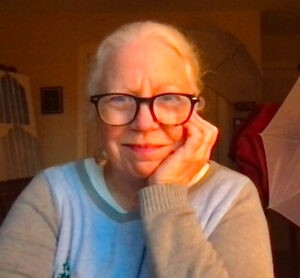
Peggy Haymes
“Just over a decade later, he preached the sermon when I was ordained. The church moved the date of the Lottie Moon Christmas Offering program to accommodate my service, which for a Southern Baptist church was a miracle right on up there with the parting of the Red Sea. I’ve joked with folks that this was the true affirmation of my calling, but deep down I knew they did it for Randall.”
A pastor beloved by other pastors
Steve Pressley wrote the definitive biography on the pastor and educator, Randall Lolley: Thanks for the Memories. One of the contributors to that book was Michael Blackwell, who today serves as president of Baptist Children’s Homes of North Carolina.
Blackwell remembers Lolley as “no ordinary preacher” and as someone who was “Brilliant with a Capital B.”
As a Southeastern Seminary alumnus himself, Blackwell believed Lolley was the perfect fit for the presidency, a role that was indeed Lolley’s “dream job, a nudging he had felt deep in his bones for several years.”
That dream became a reality for 12 years until it ended as a nightmare.
“Randall Lolley had a backbone of steel,” Blackwell wrote. “He would neither compromise his integrity in light of the Southeastern ‘takeover’ nor bend to pressure to conform to theological exclusivity. His days at Southeastern were numbered, and his dream job went up in flames.”
But even through that trauma, Lolley shone a light for others, he added.
“What did Randall Lolley teach me?
- People are more important than programs, but it does take people to make programs work.
- Say a good word to anyone you meet, especially those who are struggling, less fortunate or in obvious distress.
- Cast a vision of challenge, compassion and hope.
- Seek wise counsel when having to make a difficult decision.
- Respect your various constituencies and they will come to trust you.
- Leadership is valid when others willingly follow your direction.
- Stand in your own truth.
- Never stop learning.
- Have (and maintain) a good sense of humor.
- Pray without ceasing.
- Live, love, laugh and be happy.”
“His influence lives on in women and men who are open to follow New Light, wherever that Light may lead,” Blackwell concluded. “Fearless and humble, courageous and curious, the life of W. Randall Lolley will bless many others for generations to come.”
Note: A celebration of life for Randall Lolley will be held on Saturday, May 14, 2022, at 1 p.m. in the sanctuary of First Baptist Church, 1000 West Friendly Avenue, Greensboro, N.C.
Related article:
Randall Lolley, key figure in resisting SBC’s conservative shift, dies at 90

